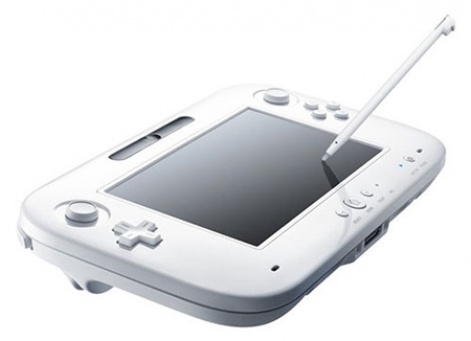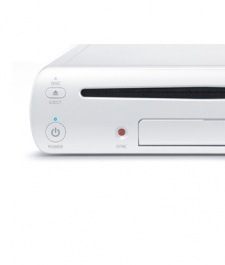And yet, every single time the Big N has a new piece of kit on the horizon, there's never any shortage of shouty commentators arching their bushy eyebrows in the direction of the Japanese giant.
Its latest piece of hardware, the Wii U, has come in for enormous stick for all sorts of reasons. The quality of the software. The disastrous E3 press conference. And, most recently the launch price.
Taking a caning
Strictly speaking, Nintendo doesn't actually set the price in Europe. Ever since 2002, it has had to tiptoe on eggshells ever since it got a 149m (£92.1m) spanking by the EU over price-fixing in the 1990s.
Ignoring the semantics for a minute, Wii U's not going to be cheap - or at least not as cheap as the £179.99 Wii was upon its release in late 2006.
The Basic Wii U pack, with 8GB of in-built storage is available for pre-order for as low as £224.99 (and typically £249.99) while the Premium pack (with 32GB of storage, charging cradle, various software discounts and a copy of NintendoLand) will be available from £274.99, right up to over £300 depending on your retailer preference.
Taking bothersome things like inflation into the equation, the basic Wii U's not far off where the Wii was, and provides a tablet controller into the bargain - something that's certainly not going to be exactly cheap to manufacture - so definitely lay off Nintendo about that one.
The price is fright
Price is always an emotive issue when it comes to any new hardware, especially gaming kit, but let's put it in perspective. The PS3 launched in 2007 at, lest we forget, £425, while the hideously unreliable Xbox 360 launched at £299.
And what about new tablets and smartphones? Over £400 is the entry level.
So if we can accept that the price is right for Nintendo, what about the functionality and quality of the experience?
On the basis of what it has shown to the world to date, there are lots of reasons for Nintendo to be cheerful. For a start, it's the only gaming system that can adequately combine legacy controls, with the modern touch, tilt and swipe controls of tablets and smartphones.
While Microsoft has the intriguing SmartGlass concept ready as a spoiler, and Sony has plans of its own by integrating the PS Vita more closely with the PS3, both present users (and developers) with plenty of issues.
No support
SmartGlass might well offer users a useful touchscreen to browse maps and the like, but it's an either/or solution - you'll have to put down the controller to access it.
Using a PS Vita as a controller for the PS3 (and potential second screen) has the greatest spoiler potential, but the installed base is so low, who's going to develop for it? Hardly anyone. As ever, it comes down to whatever the lowest common denominator is. Always.
With the Wii U, the presence of the tablet with its integrated physical controls means that every developer has free reign to make use of both the analogue sticks and buttons, as well as calling upon the touch, tilt and even the camera functionality should they wish.
In the right hands the Wii U has the potential to deliver the kinds of new games that any next generation system should have, and many of the minigames within the bundled NintendoLand already demonstrate that.
The one major downside, though, is that buying extra Wii U controllers will be out of reach for most gamers. At around £100 each, it's highly unlikely that many players will want to get another one, which, in turn, means that few games are even likely to bother with supporting multiplayer games that require more than one screen.
Innovation
That said, from what we've seen so far, there's enormous potential for all-new kinds of multiplayer game, where one person sees something entirely different on the tablet screen to the players watching the television.
Although some perceive it as a problem, others are simply designing new types of games around it.
Less easy to stomach for some is the fact that you won't be able to use the Wii U's tablet controller as a portable gaming system outside the home.
Despite the fact that the Wii U system allows you to carry on playing certain games on the tablet handset if, say, someone else wants to watch TV, you can't store games locally and use it like you would an iPad.
After all, the practicalities of this would either involve a totally lag-free, reliable, and fast remote play system, or involve replicating the console's hardware in the tablet handset - and that's obviously not something Nintendo can provide at the kind of price people would be willing to pay in 2012.
If, however, Nintendo can perhaps allow some simpler Will U minigames to be downloaded and played on the 3DS for portable play outside the home, then gamers would be far more likely to get over the perceived 'inconvenience' of not being able to make full use of the Wii U's tablet.
First mover disadvantage
Perhaps the biggest threat for Nintendo is the fact that it has - rather uncharacteristically - chosen to move first in the market.
By doing so, it allows both Sony and Microsoft (and anyone else who decides to muscle in, such as Valve), to trump its offering with far more exciting alternatives.
The worry is that by underspeccing the Wii U in graphical terms, Nintendo has left itself wide open to being perceived as behind the curve by a full generation. But while this arguably had the opposite effect when the Wii launched, this time around, Sony and Microsoft have a golden opportunity to offer everything the Wii U has and a whole lot more.
But at the end of the day, gamers aren't sold on specs, but on the quality of software, and as long as Nintendo has enough in its locker to lure people in, it doesn't really matter what industry commentators have to say on the matter.
Yes, Wii U might well 'do a GameCube', but even that was highly profitable. And when Nintendo decided it had got it wrong, it simply redesigned essentially the same piece of hardware, threw in some motion controllers and sold more consoles than anyone.
As ever, you underestimate Nintendo at your peril.

The Wii U will be released on November 30th across Europe, and November 19th in North America.





















